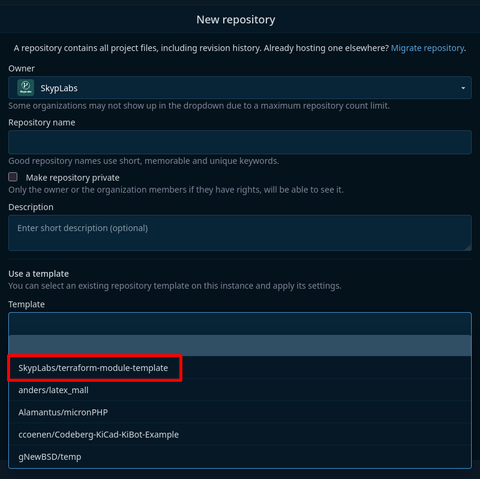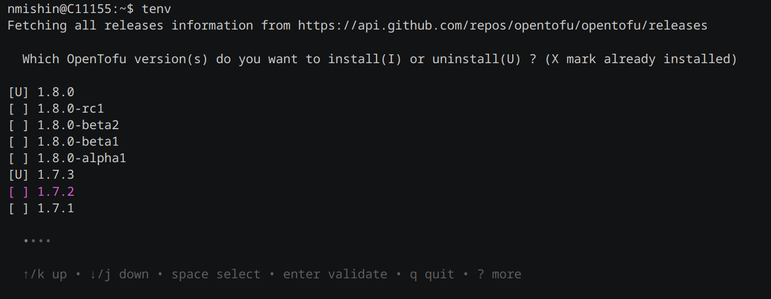first time using #opentofu instead of #terraform for #iac to test any differences. so far: the web registry has a slightly nicer design, but similarly bad search
Recent searches
Search options
#OpenTofu
We have migrated our OpenTofu/Terraform module template from GitHub to @Codeberg.
https://codeberg.org/SkypLabs/terraform-module-template
It follows the standard module structure as described in the OpenTofu documentation, plus some non-standard but commonly used files and folders. The template also comprises a pre-commit configuration file.
Feel free to use it (public domain licensed), and if you do, don't hesitate to share your feedback with us if necessary!
Happy  , today I deployed a #Forgejo instance to manage my private code projects. I won't be using #Github anymore for my stuff, only to contribute to 3rd party projects.
, today I deployed a #Forgejo instance to manage my private code projects. I won't be using #Github anymore for my stuff, only to contribute to 3rd party projects.
I still have some pending work to configure the CI workers, but I'll leave that for next week.
Along the way I've learnt some stuff about #OpenTofu and networking. Enough to know that I still prefer to be on the dev side of the "devops"  .
.
Easter hack: terraform-provider-openwrt
https://linderud.dev/blog/easter-hack-terraform-provider-openwrt/
I suppose I should pretend to know something about #OpenTofu and write a blog post or something.
Skype will shut down soon. I wanted an open source alternative so I tried Galene (https://galene.org/) multiple times to call my dad and it works very well.
For now, I spawn a disposable instance on OVHcloud using OpenTofu and the OpenStack provider. Then I configure the software using Ansible. The code is available here https://git.riou.xyz/jriou/galene-cloud.
Tomorrow, I would like to only host a TURN server on my VPS and self-host galene on my homelab.
Soon I might have a clue about #opentofu (those scary Terrahawks kept me off #Terraform).
Now I just need to hope #Azure will stop having resource availability issues in CentralUS or EastUS.
It'd be "such a shame" if we had to move back to AWS.
New shitpost from our Developer Experience team: "Tell me terraform no longer segfaults without telling me it no longer segfaults"
Happy Friday (deploy) everyone!
A versatile version manager for #OpenTofu, #Terraform, Terragrunt and Atmos, written in Go.
#golang
OK, today I took some time and finally reworked the #semaphoreui package for @opensuse. I had it on my todo list for ages and never got around to it. It was already 90% finished but lacking some fine details.
Now I have properly cleaned it up and removed the "ansible-" from the name, as it is no longer just for executing #Ansible code. Apparently Semaphore can now execute #terraform #opentofu and #pulumi code as well.
I'll do more testing before I send it to #Tumbleweed.
In other words: new vagrant-libvirt setup incoming! :-)
Stay tuned.
Whew...the muscle memory to type "tofu" instead of "terraform" is *really* strong. I made the switch fully a couple of months back, finally updating all my IAC repos to use #OpenTofu instead of #Terraform. I took the opportunity to centralize on a single reusable release pipeline instead of each having their own, which I honestly should have done in the first place but that's showbiz baby.
It's just like how when I switched to using "main" as my primary repository name, it took time to rework that muscle memory but eventually that became natural for me and typing in anything else when branching and merging felt strange.
So while maybe DevOps and SRE shouldn't be seen as a reflection of real life, in this case I think there's a lesson to be gleaned. Sometimes breaking a habit is hard. Sometimes it's more than just a habit and you're trying to change something fundamental about yourself or your work environment and that's even harder and maybe even impossible for some. But striving towards that goal is still important. Maybe it'll take you a year to make a change feel natural. Maybe it'll taken ten. Maybe it'll never feel 100% authentic and natural. That time is going to elapse either way. You can choose to stay right where you are right now or you can refactor and work towards something else and see how far you get.
Might as well right? Tech debt, emotional debt, it all comes due at some point and if you don't start now then it'll keep accruing and you'll still be sitting here 1 or 5 or 20 years from now thinking maybe you should fix something.
This is a post about #devops but I only got a few sentences into this before I realized I really wanted to write about life and about change and about doing something different.
So maybe what I do to pay the bills is more rooted in real life than I thought.
Discovered there is a way to move state if you need to rename a resource in OpenTofu/Terraform:
tofu state mv google_compute_subnetwork.current-region google_compute_subnetwork.current_region
do folks have opinions on which #OpenTofu / #Terraform provider to use for #Proxmox?
Anyone using terraform/opentofu for their homelab setups? Either on infra level or for CM?
I've made it a project for this year to get everything managed via gitops. I'm taking it step by step and as such I haven't locked down manual write access so that I can tinker with stuff and troubleshoot as needed.
I'm finding that I need a good way to spot state drift so that I get notified if I forget to correct things afterwards. I think this is going to be less frustrating than fighting against enforced state while I get my bearings.
I guess I could use a cron or a timer unit. Unless someone has any recommendations? I would like to manage all the TF using fluxcd eventually but I think it's too early to start enforcing desired state right now. I'm open to suggestions...?
howdy, folks - it's been a bit since our last #hachyderm infra check in.
stuff in motion:
- ditching #terraform cloud & tf for #opentofu and #atlantis. we are just about to import our dev environment and put it through its paces.
- bringing #postgresql under ansible management. the team has been doing awesome work, and we've started to spin up dev nodes using the new playbooks. soon: production!
- moving #DNS zones away from AWS route 53. we chose bunny DNS as our provider and have been doing basic tests in dev. we'll likely prep our records for production this week with a plan for a cutover in one of the coming weekends.
and if you filled out our volunteer form and haven't heard from me in a bit - you're still on the list. we'll onboard a new batch of folks in the next couple of weeks.


I must admit, writing in OpenTofu / Terraform is the first time in a while that I’m actually having fun with code. It is just genuinely enjoyable. It’s been a long time since I’ve had this much fun tinkering with code.
#OpenTofu #Terraform #IaC #DevOps
Finished up “testing/evaluating” bare metal #OpenShift on my 3 Minisforum #ms01 nodes (didn’t get very far before abandoning), and back to #proxmox. Now to learn some #terraform and/or #opentofu, and #ansible to repopulate the cluster instead of doing everything manually. #homelab






